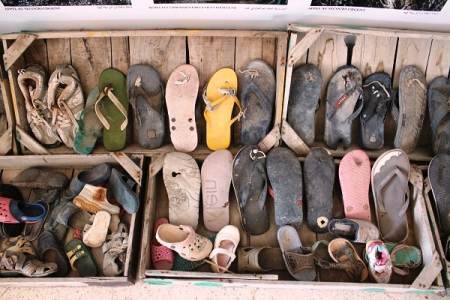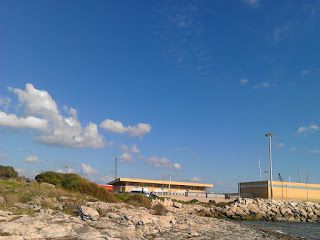An attack on humanity
Article first published on June 7, 2021
As the 20-year anniversary of the G8 summit in Genova approaches, Italy continues to be a country that too easily and too often tramples on human rights and through its institutions becomes guilty of crimes.
Only in the last few days we have seen a video of prison officers torturing inmates inside a prison and a video of migrants being shot at and rammed by Libyan coastguards who are paid, trained and funded with Italian and European public money.
In the meantime, in order to leave the Libyan criminals as much open field as possible, the Italian authorities are using technical loopholes to block the NGO rescue ships in the ports.
We are a state that mistreats and kills people in its custody and those it is supposed to protect, a state where people die every day in the workplace. A state that carries out attacks on humanity and remains unpunished.
The sea continues to return bodies to the Tunisian and Libyan beaches, while hundreds of mothers mourn for their children who cannot arrive. Women and children pay the highest price of this one-way war carried out by a short-sighted Europe turning its back on human suffering.
Arrivals and deaths are a daily occurrence on Lampedusa, always triggering the same emergency rhetoric. Leaving the hotspot and the island always in a state of distress is criminal. For too many years we have had to witness the usual indecent spectacle of overcrowding and foam mattresses thrown on the ground in the courtyard of an inadequate structure that is constantly being renovated. A center with only two doctors who have to attend 700 people, many of whom are vulnerable and often have previous problems. What kind of care and attention can two doctors per shift provide? None.
Just as legal assistance is totally absent. In Lampedusa no information is given – a clear choice by the current and previous governments – denying a right to people who arrive. The hotspot approach continues to be based on skimming on the basis of the nationality of the people arriving, with the consequence that very few North Africans are able to ask for protection. There is no clarity and no time to listen to what people would like to say.
More unaccompanied minors on quarantine ships
This perverse mechanism also means that many unaccompanied minors end up on the quarantine ships, and we are therefore obliged to continue to submit complaints to the competent authorities in order to put an end to these unlawful practices. In response to the latest report, the Juvenile Court in Palermo replied that the Trapani Police Headquarters had stated that there were no unaccompanied minors on board of the Adriatico ship. In reality, the problem that occurs – in this as in many other cases – is that due to the lack of legal information and the hastiness of the identification operations the minor’s age is ascertained only on board of the ship where the minor is then forced to stay for the quarantine period.
We also receive reports of minors accompanied by relatives who have just come of age, who are separated because if the young adult is Tunisian he is taken to the Detention and Repatriation Center (CPR), while the minor is placed in a community. Often these are children between ten and twelve years old who are separated from the only link they have in Italy. On the quarantine ships the operators hired by the Red Cross are often inexperienced, which makes their work ineffective. The difficulty (or we could say the near impossibility) for Tunisians to access protection is reported by the numerous reports and requests for help that reach our association (and others). Many Tunisians write asking for a lawyer because they are not listened to, and many relatives write requesting news about their relatives who have been locked up in Lampedusa for weeks without any explanation.
Another practice implemented after the end of quarantine on the ships for Tunisians is the passage to the next stage: the airport for repatriation without even passing through the CPR, depending on the availability of places. Only chance defines the destination for them, since there are Tunisians taken to Gradisca or Milan only to be brought back to Palermo for repatriation after the procedure. Basically, money on top of money to feed the border control business – a traffic legalised by politics.
The state and the figures of the reception system in Sicily
The other business of migration is related to the reception system, in which still in too many structures the conditions become worse year after year. Even in the diffused reception and integration system, whose acronym keeps changing (the most recent one is SAI), the reception modalities in many centers are more and more similar to those of the Extraordinary Recepion Centers (CAS). Emergency work is being done even in centers that should be Italy’s elite. We have received numerous reports in the last few weeks, especially regarding the SAIs in the area of Trapani and the CASs in the area of Agrigento, where it seems that there are families left on their own and involved in violent fights between different factions without the managing body taking any action.
We have also received reports of vulnerable newly turned adults being placed in SAIs and escaping after two days from rooms with no wardrobes, with cockroaches and so hot that people are forced to sleep on balconies, abandoning a possible path to integration in Italy.
This is a system that has nothing to do with integration: the only credit the cooperatives that manage the SAIs as if they were CASs deserve is the creation of ghosts, who wander around Sicily. Because of Covid-19 we have not yet had the opportunity to verify the testimonies of the children and families who contact us but we continue to maintain a high level of attention by diverting all the reports to the competent authorities so that they can carry out their task of monitoring all the reception facilities.
Monitoring – almost non-existent also because of Covid-19 – leaves huge cracks in a reception system that has already been inefficient for a long time and increases the criticality. Especially the conditions of those living in the CASs are and remain a mystery to public opinion. However, if we refer to the testimonies of many people it seems that we have returned to the days of the management by the civil protection in 2011.
As of today according to the information received from the Ministry of the Interior, following our request for generalised civic access, there are 78 active CAS in the provinces of Sicily. They are distributed as follows: 17 in Palermo for a capacity of 751 places, 16 in Ragusa for a capacity of 554 places, 8 in Trapani for a capacity of 473 places, 5 in Siracusa for a capacity of 473 places, 10 in Agrigento for a capacity of 365 places, 10 in Messina for a capacity of 342 places, 10 in Enna for a capacity of 311 places and 2 in Catania for a capacity of 37 places. Siciliy counts with a total of 3,287 places in the CAS and the only province without places is Caltanissetta where currently the CPR and a Covid center for 195 persons are located. Catania is the province with the fewest places after years in which with the mega Reception Centre for Asylum Seekers (CARA) of Mineo it had the European record of presence of asylum seekers.
The Covid places in Agrigento (309), Ragusa (195), Trapani (179) and Siracusa (37) must be added to these figures, making a total of 995 Covid places in Sicily.
The province of Agrigento is exposed to greater pressure due to the presence of Lampedusa and the management of the quarantine ships. For this reason the prefecture should be reinforced with personnel in the first place instead of being left in more disarray year after year.
This too is a symptom of a disease that Italy has taken with it for years, improvisation that accompanies fascism that is less and less hidden, resulting in attacks on humanity that are perpetuated day after day to the detriment of innocent victims of a broken system.
Alberto Biondo
Borderline Sicilia
Translation by Timea Campedelli




